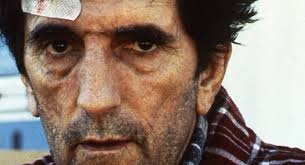Eddie Arcaro, the outlaw leghorn.
Another Ben Carmean cover off the ball outa the park design.
The vacuum the dogs left us hasn't been filled by a longshot, it's a crater, but various creatures are tumbling into it and vying for attention. Squirrels are coming closer. Roosters and peacocks and peahens are here part time, though one rooster has taken up residence. I worry about him at night. If anyone reading this has a line on a small chicken coop or something the rooster can stay in at night, contact me. I might get some chickens to keep him company. He's a bit of an outlaw. Banished I think. He chases the squirrels and the cat that comes around to eat the dry dogfood that I mix with the chickenscratch.
The peacocks jump up where I feed the wild birds and fill up. Now the rooster does that. He stays in the loafing shed with the horses, hollers get up get up at first light. His crow sounds like "Eddie Arcaro." Then he comes up on the deck to crow, remind me to get his water and food.
I think Eddie Arcaro is in my life to get me up and writing earlier. Not that I've been terribly lax in that department; I've done another book of poetry titled "Horses See Ghosts" and it's waiting for a publisher at the moment. The cover is another wonderful Ben Carmean creation. He does more than one and it's always hard to choose, because he starts with great and ramps up from there. Horses do see ghosts, I've watched them at it. This cover captures that. Stands to reason they would see horse ghosts.
As if things weren't weird enough...
I guess I have to finish the novel now, though that has its attractions. My characters are breathing now and going about doing things that surprise me. That book is "L.A. Hardscape" and it's about a lapsed boxer turned hallucinatory private eye in current day Los Angeles, replete with fires and quakes, human trafficking, and Nazi art theft caches. No shortage of stuff going on there.
In other areas, the shoebox ford is in the shop having (sort of) original suspension reinstalled and scrapping the damn airbags. I got tired of bottoming out on shadows and expansion joints. And having to set the car off the drive shaft every time I drove it. I got a set of leaf springs from Shoebox Central that were pre-lowered at three inches. That plus the two inch blocks will give it the old taildragger profile I so loved in high school. The new suspension will be better than the original 1949, not hard to beat. Suitable transportation to the malt shoppe for me and my gal Freddie.
Blue Horse & Wagon, rolling to The Hilliard Gallery in May
Speaking of F, she gave me these super shades a couple days ago, which she got me for a pre-valentine's gift at a ritzy boutique. Mad bomber glasses. Which is no reference to the morons in ski masks, but a simpler time.
Writing. Been doing some short stories and placing them in some paying venues, some non-paying. Poems. I was curious to see how many stories, essays, blogs and poems I'd actually had accepted from last year's tally and am up to twenty seven. Still paying my dues and approaching with hat in hand, but making headway. Got some coming out in February and in spring issues, so the winter hasn't been idle. Plus the May show is approaching at The Hilliard Gallery. Here's a little preview of that. Blue Horse & Wagon. And I have a pile of Kevin Lee hot rod and bike parts waiting in the wings. When I went out to shoot Blue, I saw Eddie Arcaro looking at himself in the shiny reflection in a car. He was mesmerized. Thinks he found a new friend. It made me happy. That and the thermometer says sixty in the shade. Not bad for Kansas on January 27. I wish you well. G













